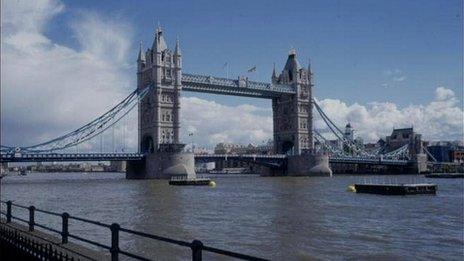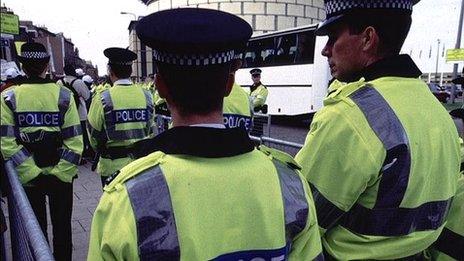London students 'face crime risk'
- Published

The figures relate to the areas surrounding universities and include all victims of crime
Students in London could run a higher risk of being a victim of crime than those in other parts of the country, the Complete University Guide suggests.
Outside of the capital, universities in Manchester are among those located in areas with high crime rates, it finds.
The guide used official police data in the compilation of its research.
It looked at the levels of three types of crime which, it says, are most relevant to students - burglary, sexual and violent crimes and robbery.
The figures relate to the areas surrounding universities, not just university premises, and include all victims of crime, not just student victims.
The report authors said this was because official data for crimes affecting students specifically was unavailable.
The data, which lists London universities separately due to the higher crime levels in the capital, covers all higher education institutions in England and Wales.
Crime rates
It says the Institute of Financial Services (IFS) University College in London and King's College London are located in areas with the highest crime rates for the three types of offences examined, with about 36.65 reported incidents per 1,000 residents between May 2013 and April 2014.
In total, 20 London universities were in areas with higher crime rates than other parts of England and Wales.
The report says the Royal Northern College of Music in Manchester is situated in the area with the highest crime rate outside of London, with about 28.87 incidents reported per 1,000 residents.

The report says students should be able to compare the risks for individual institutions
This was followed by Manchester Metropolitan University (28.66 reported incidents) and Manchester University (28.58 reported incidents).
At the other end of the scale, the independent Buckingham University is situated in an area with the lowest crime rate at 7.22 reported incidents per 1,000 residents, followed by Winchester university (8.54 reported incidents).
In London, Kingston University is in the area with the lowest local crime rate, with 15.41 reported incidents per 1,000 residents in the three categories examined.
Raising awareness
The guide's principal author, Dr Bernard Kingston, said: "It is to the credit of many universities, especially those in high crime areas, that they do much to advise students on precautions they should take to avoid becoming the victims of crime.
"But many students, including those from overseas attracted by the strong academic reputations of the UK's universities, are all too often unaware of the level of crime in the areas around their chosen institutions.
"All prospective students should be able to compare the risks for individual institutions with much greater precision."
A spokesman for IFS University College said: "Like any other university located in a major city, IFS University College includes comprehensive advice and guidance regarding personal safety as part of its induction processes for new students."
London Bridge
A King's College London spokeswoman said: "The Complete University Guide's annual crime survey uses police data of crimes reported by all residents, not just students, living within three miles of each university.
"In the case of King's, one of London's most central universities, this includes the major transport hubs of Waterloo and London Bridge.
"London faces similar challenges to many other major cities in dealing with crime. We regularly communicate the importance of personal safety to students, through our welcome and orientation sessions, which include student safety advice from the Metropolitan Police, through leaflets and our website.
"Serious incidents involving students are an exception and we have College and Students' Union welfare teams available to provide professional support in these small number of cases, as well as strong security measures in place across all our campuses including swipe card access, video monitors and security on a 24/7 basis."
Deputy vice-chancellor at the University of Buckingham, Alistair Alcock, said: "We are delighted that Buckingham is the safest university campus in the UK.
"We know that being safe is one of the reasons we consistently score so well for student satisfaction in the annual National Student Survey (NSS)."
- Published14 April 2014

- Published12 June 2014
